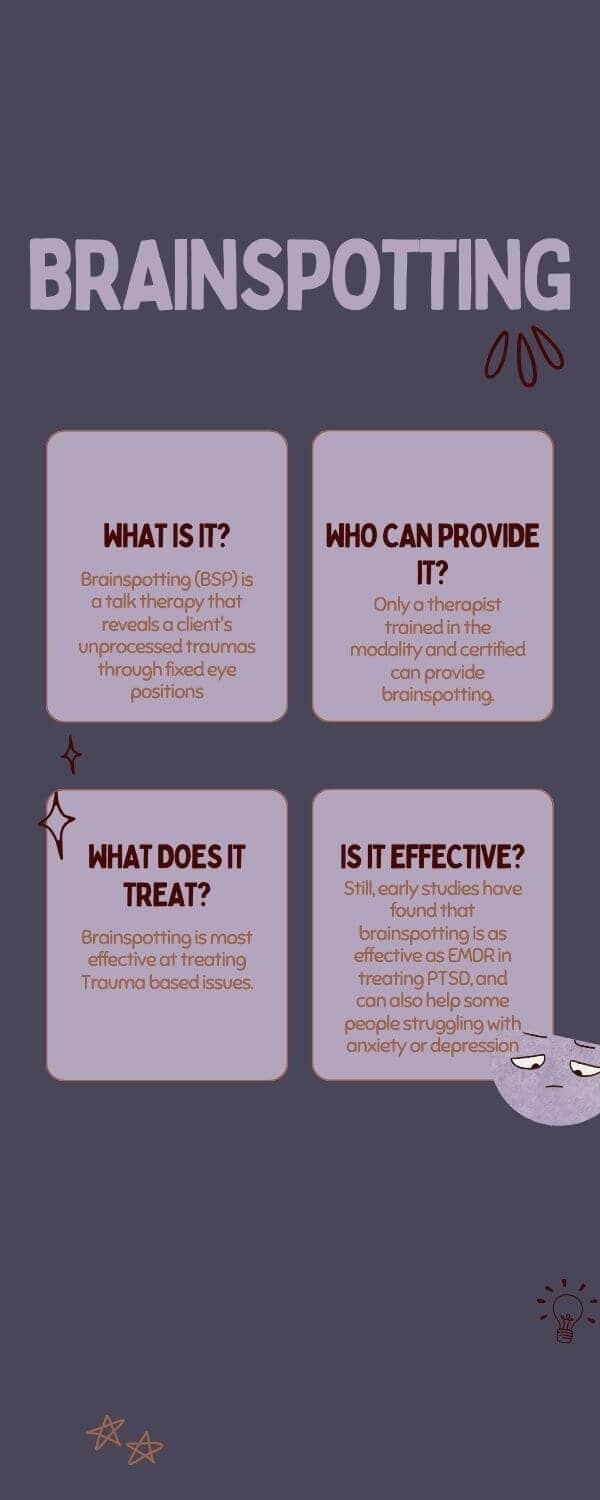What is Brainspotting Therapy?
Brainspotting is a type of therapy that is designed to help individuals process and heal from unresolved emotional trauma. It was developed by David Grand. He is psychotherapist who observed the relationship between eye positions and emotional experiences. Brainspotting works by using the client’s eye positions to locate and access the specific area of the brain where trauma is stored. By doing so, clients are able to process their emotions and release trauma in a way that is safe and effective.
During a brainspotting session, the therapist will work with the client to identify a “brainspot”. A specific eye position that corresponds to a traumatic memory or emotion. The therapist will then use various techniques to help the client process their emotions. Its meant to release the trauma stored in that area of the brain. This can involve focusing on physical sensations, emotions, or visualizations. While maintaining the identified eye position. Brainspotting is typically used in conjunction with other types of therapy, such as talk therapy or cognitive-behavioral therapy. It helps clients achieve lasting healing and recovery.
Overall, brainspotting therapy is a powerful and effective treatment option for individuals who are struggling with unresolved emotional trauma and distress. By accessing the specific area of the brain where trauma is stored, clients are able to process and release their emotions in a way that is safe and non-invasive. With the guidance of a trained therapist, clients can work towards healing and recovery. They achieve a greater sense of emotional well-being and resilience.
Resilience Behavioral Health provides Dual Diagnosis Treatment and Co-Occurring Rehab Program in Massachusetts. The program can be accessed remotely via telemedicine or in-person.

Is Brainspotting Therapy legitimate?
Yes, brainspotting therapy is considered a legitimate and evidence-based therapy approach. It has been used successfully in treating a variety of mental health conditions, including anxiety, depression, trauma, and addiction. While more research is needed to fully understand the effectiveness of brainspotting therapy. Many mental health professionals have reported positive outcomes with their clients who have received this type of treatment.
Still, early studies have found that brainspotting is as effective as EMDR in treating PTSD, and can also help some people struggling with anxiety or depression. Studies have also found that clients with these disorders can make significant progress in just 1-3 brainspotting sessions, similar to EMDR.
What does Brainspotting primarily treat?
Brainspotting therapy has been used to treat a wide range of mental health conditions and emotional distress. It is especially effective in addressing the effects of trauma and emotional dysregulation, including symptoms such as anxiety, depression, and post-traumatic stress disorder (PTSD).
Brainspotting therapy can also be used to address issues related to addiction, performance anxiety, grief and loss. It can address other emotional challenges. By accessing the specific area of the brain where trauma and emotional distress are stored. Brainspotting can help individuals process and release these difficult experiences and emotions. This leads to increased emotional regulation and greater overall well-being. Additionally, brainspotting therapy can be used as a complementary treatment alongside other forms of therapy or medication to help individuals achieve lasting recovery and healing.
How is Brainspotting therapy utilized in Resilience Behavioral Health's Trauma Programming?
At Resilience Behavioral Health, all Primary Therapists’ are trained and certified in Brainspotting Therapy as a condition of providing services at the program.
The Clinical Architect’s of Resilience Behavioral Health believed it to be vital that truly Trauma Informed Care was provided by the Clinical Team. Brainspotting is utilized as part of our Mental Health Programs during the individual clinical therapy provided to each client enrolled at Resilience.
Is Brainspotting Therapy covered by insurance?
Yes, in the United States, dual diagnosis treatment and Brainspotting Therapies are typically covered by insurance, including private insurance. Medicaid, and Medicare are also covering this treatment. Under the Affordable Care Act (ACA), insurance plans are required to cover mental health and substance abuse treatment. They must cover the same level as other medical services. This means that individuals with co-occurring disorders have the right to access affordable, comprehensive care.
The level of coverage for dual diagnosis treatment may vary depending on the specific insurance plan. Most plans cover a range of services, including inpatient and outpatient treatment, medication management, and therapy. How to determine your insurance coverage for dual diagnosis treatment? It’s important to contact your insurance provider directly. You can work with the treatment program’s staff to verify your insurance benefits and coverage.
It’s important to note that while insurance can help cover the cost of dual diagnosis treatment, there may still be out-of-pocket costs. This includes copays or deductibles. Some treatment programs may also offer financial assistance. Sliding scale fees for individuals who cannot afford to pay the full cost of treatment are available.
For a completely confidential, free, and expert consultation give Resilience Behavioral Health a call today at (888)-401-1179 and speak with a treatment placement specialist.

